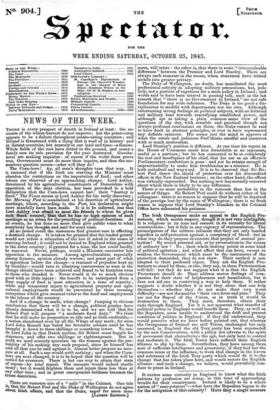NEWS OF THE WEEK.
THERE is every prospect of dearth in Ireland at least : the ac- counts of the wheat-harvest do not improve; but the potato-crop appears to be a failure throughout potato-eating countries ; and 'Ireland is threatened with a thing that is read of in history and in distant countries, but scarcely in our land and time—a famine. Whole fields of the root have rotted in the ground, and many a family sees its sole provision for the year destroyed. Govern- ment are making inquiries : of course if the worst fears prove true, Government must do more than inquire, and then the mo- mentous question occurs—what will they do?
The Corn-laws! Ay, all men's thoughts turn that way. It is assumed that if the Irish are starving the Minister must abandon the restrictions on the importation of food ; and other tokens are observed of an approaching change. Lord Ashley, threatened by his agricultural constituents of Dorsetshire with -opposition at the next election, has been provoked to a bold declaration that the Corn-laws cannot last : their "destiny is fixed." The Times sneers at Lord Ashley for his tardy discovery ; the Morning Post is scandalized at his desertion of agricultural meetings, where, according to the Post, his declaration might more manfully have been made. Itis to be inferred, less that Lord Ashley was afraid to meet the.friends to whom he gives such frank counsel, than that he has no high opinion of such meetings as an arena for the preaching of political doctrines. At all events, he has done no more than give public voice to what everybody has thought and said for some time.
At no period could the statesman find greater ease in effecting a destined change. It is taken for granted that the landed gentry would not refuse a relaxation of the law if asked in the name of starving Ireland ; it could not be denied to England when granted to the sister country ; if granted for a time, the law could hardly be renewed. Never, perhaps, would a Minister encounter less opposition to the measure. Among agriculturalists, especially among farmers, opinion already wavers ; and great part of what is opposition before the change--a remnant of prejudice kept up by timidity—would turn to admiring concurrence as soon as the change should have been achieved and found to be harmless even to those who dreaded it. Never would it do so much obvious -pod with so little injury : the benefit to be anticipated from a freer supply of food is most attractive in a time of scarcity ; while any temporary injury to agricultural property and agri- cultural employments would be prevented by those teeming enterprises which give unusual value to the land and employment to the labour of the country.
And if a change be made, what change? Jumping to obvious conclusions that there will be a change, political gossips have already determined what it is to be, and we are told that.Sir Robert Peel will propose "a moderate fixed duty." We trust that he will make no proposition so idle and so little creditable,— a notion abandoned even by all the Whigs of any mark; for even Lord John Russell has 'bated his favourite scheme until he has brought it down to three shillings or something lower. To out- do Lord John in that Dutch auction, Sir Robert must haggle for sixpences, and offer two shillings or eighteenpence. But in sooth we need scarcely speculate on the reasons against the pro- bability of his making any such proposal, since he himself has said all that can be said against it. Almost better propose no mea- sure at all. Such a one would settle nothing; and when the Corn- lows are next changed, it is to be hoped that the question will be settled for evermore. There is but one way to attain that state of repose—by total repeal. The measure would indeed startle many but it would frighten them and injure them less than at any other time ; and in great emergencies boldness becomes the truest discretion.


























